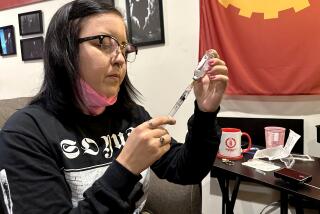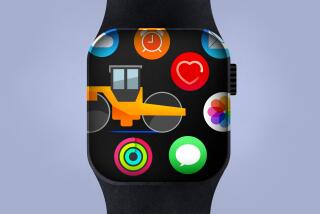Column: âAlexa, whatâs my blood sugar level and how much insulin should I take?â
Itâs become a punchline in the tech industry that every start-up is out to change the world. When it comes to medical technology, however, some of the biggest names in Silicon Valley are poised to do just that.
Apple, Google and Amazon have announced or are reported to be developing cutting-edge technologies for managing diabetes, one of the fastest-growing chronic illnesses, affecting more than 420 million people worldwide.
Experts say weâre at the dawn of a new era of personal technology for a variety of chronic conditions, including diabetes, heart disease and hypertension.
âIt really isnât a surprise youâd see companies like Apple and Google focusing on this,â said Mike Matson, a senior analyst at the investment firm Needham & Co. âTheyâre always looking for new opportunities for growth and healthcare is a big market.â
Managing a chronic condition can depend on easy access to data, he said. âIf youâre a Google or Apple, you know how to manage data.â
The latest diabetes-related tech endeavor to be announced is the Alexa Diabetes Challenge, which focuses on finding ways for the Amazon Echo smart speaker â and its Alexa digital assistant â to assist people with Type 2 diabetes in living healthier lives.
Type 2 is by far the most common form of diabetes, frequently associated with obesity. Roughly 95% of the nearly 30 million Americans with diabetes are Type 2.
The Alexa challenge features a $125,000 grand prize for whoever comes up with the best diabetes app for the Amazon Echo, as well as $25,000 each for up to five finalists. Funding is being provided by the drug company Merck, manufacturer of the Type 2 meds Januvia and Janumet.
Not surprisingly for the tech industry, the contest boasts a very fast pace. It was announced in April. The deadline for submissions was last month. Finalists will be announced in July. Demos of selected apps will be conducted in September and a grand prize winner will be announced in October.
Itâs thus entirely possible that people with diabetes may be using some of these apps by the end of the year. An Amazon spokeswoman declined to comment.
âThereâs so much information for diabetes management available,â said Sara Holoubek, chief executive of Luminary Labs, a New York consulting firm thatâs organizing the Alexa Diabetes Challenge on behalf of Merck and Amazon. âSo why is it still so hard to get that information? Maybe we can change that.â
Alexaâs voice control is the key. Whereas someone newly diagnosed with Type 2 diabetes might not know where to start in researching and managing the disease, being able to ask Alexa basic questions may help get people on the right track.
âWhat can I eat? How much exercise should I get?â Holoubek said, citing some of the unknowns that suddenly arise with a diabetes diagnosis. âNormally youâd ask your endocrinologist or diabetes educator. Alexa could be like having an educator in your home.â
But thatâs just a start. Holoubek said Merck and Amazon envision a networked household that incorporates various smart devices. For example, a person with Type 2 diabetes might weigh himself on a smart scale, which would transmit data to the Echo. The personâs blood-glucose monitor would do likewise.
Now imagine if the person asks Alexa if it would be OK to eat some potato chips. Alexa theoretically would be able to calculate the effect this could have on his or her blood sugar. The system would be able to suggest how much activity would be needed to balance things out or, better still, come up with a more healthful snack.
I have Type 1 diabetes â the autoimmune form that requires daily insulin injections â and managing the disease is a full-time job. I already have some very cool gizmos. I wear a glucose sensor on my torso that sends data to my iPhone, which in turn feeds my blood sugar level to my Pebble smartwatch for easy viewing.
I have an Amazon Echo at home. It would be awesome if I could simply ask Alexa what my blood sugar is if Iâm puttering around the house without my watch on, or if Iâm in any danger of my sugar level crashing.
How great would it be if I could ask Alexa how many carbs are in a plate of spaghetti carbonara? Or even have Alexa calculate my insulin dose before a meal?
To be sure, thereâs much testing to be done â and federal approvals to be obtained â before such systems are handling anything like that. But the Alexa Diabetes Challenge offers a clear indication that the tech industry is pushing boundaries.
Apple reportedly is busy on this front as well, but, as usual, the company is keeping its cards close to the vest.
According to recent, anonymously sourced reports, Apple is devoting significant resources, and big bucks, to giving its Apple Watch the ability to monitor blood sugar without a sensor being inserted under the skin (such as the one I use).
Others have tried and failed to accomplish this feat, so if Apple can pull it off, this would represent a huge breakthrough in diabetes care.
The company reportedly has dozens of biomedical researchers trying to measure blood sugar using optical sensors, perhaps implanted within the band of the Apple Watch. The sensors would shine a light through the skin that would provide readings in a painless, noninvasive fashion.
CNBC reported last month that Apple Chief Executive Tim Cook was spotted âwearing a prototype glucose-trackerâ with his Apple Watch. As best as I can tell, Cook doesnât have diabetes, so heâs apparently been using himself as a guinea pig to see how well his companyâs technology responds to different foods he eats.
No one at Apple got back to me.
For its part, Googleâs parent company, Alphabet, announced last year that its life-sciences subsidiary, Verily, was partnering with the French drug company Sanofi on a $500-million joint venture aimed at improving diabetes care. Verily has a separate partnership with the British drugmaker GlaxoSmithKline.
Among the various technologies Verily is pursuing is a smart contact lens that would monitor blood sugar levels. Itâs being developed in conjunction with the Swiss drug company Novartis.
Like Apple and Amazon, Google clammed up when I got in touch.
The global market for diabetes care will be worth $35.5 billion by 2024, according to Grand View Research, and this represents a natural business opportunity for anyone in the information technology space.
Meanwhile, the millions of people with diabetes worldwide reflect an economic cost of $825 billion a year, according to researchers from Harvard, Imperial College London and the World Health Organization. Thatâs an expensive problem just begging for a bold solution.
The tools and treatments that people with chronic conditions have today are nothing less than magical compared with what was available just a few decades ago. There was a time, for instance, when a diagnosis of diabetes was a death sentence.
Now we have killer apps on the horizon that may change the world.
David Lazarusâ column runs Tuesdays and Fridays. He also can be seen daily on KTLA-TV Channel 5 and followed on Twitter @Davidlaz. Send your tips or feedback to [email protected].
ALSO
Payday lenders, charging 460%, arenât subject to Californiaâs usury law
Trump wants to deny nursing-home residents and their families the right to sue
California bill would end âpurely profit-drivenâ practice of drug-company coupons







